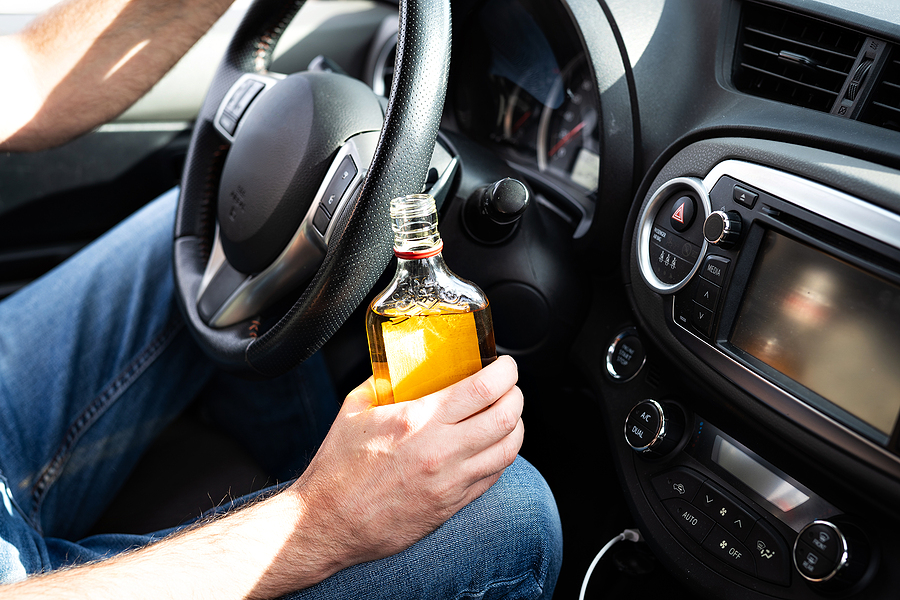Even though everyone knows that driving under the influence of alcohol or drugs is dangerous, there were 814 deaths attributed to drunk driving accidents in Florida in 2019. That year, this number accounted for 26% of the state’s motor vehicle accident deaths.
But why, exactly, is that the case? The following information will give you a deeper understanding of why getting behind the wheel when impaired is never a good idea.
The attorneys with The Eberst Law Firm can help if you’ve suffered an injury in an accident caused by an impaired driver. We have extensive experience in this area of the law, and we know how to help injury victims obtain the compensation they deserve. Schedule a free consultation by calling 1-888-CALL-JON or contacting us online.

Driving Under the Influence Causes Impairment of Cognitive Abilities
Consuming alcohol and drugs takes a profound toll on the central nervous system. These substances act as depressants, substantially slowing down brain function. This, in turn, disrupts the brain’s normal functioning, impeding a person’s ability to think clearly and rationally.
While behind the wheel, this cognitive impairment means drivers struggle to make timely and prudent decisions. They have a hard time processing the information required for safe driving.
Another problem with driving under the influence is significantly reducing a driver’s reaction time. Research indicates that driving at the legal BAC (blood alcohol content) level, .08%, results in a lowered reaction time of 120 milliseconds. If someone is driving 70 miles an hour, it would take 12 extra feet to react to a sudden hazard.
That might not seem like a lot, but it can make the difference between avoiding problems and causing a catastrophic accident. Slower reactions increase the likelihood of being unable to swerve, brake, or take evasive action in time to avoid a collision.
Drivers under the influence are also more prone to engage in risky behaviors. These include speeding, tailgating, and passing in a dangerous manner. Impaired drivers also can’t concentrate effectively. Their attention becomes fragmented and easily diverted, a recipe for disaster on the road.
Driving Under the Influence Affects Motor Skills
Intoxication takes a severe toll on physical coordination as well. Simple tasks like maintaining a steady grip on the steering wheel or using the pedals become challenging. The reduced coordination can lead to swaying behind the wheel, an inability to maintain proper lane control, or difficulty executing turns safely.
Driving impaired also causes a sharp decline in hand-eye coordination. It can result in erratic swerves, unintended lane departures, or a struggle to maintain control during turns, putting the driver and others at risk.
The consumption of alcohol and certain drugs can lead to blurred vision or even double vision, severely compromising a driver’s ability to read road signs, recognize other vehicles, or spot pedestrians.
Impaired depth perception is another problem. Drunk drivers typically can’t accurately gauge distances. They often can’t estimate the space between their vehicle and others on the road, obstacles in their path, or even the position of the road itself. Such misjudgments can result in sudden and unexpected collisions.
Risky Behavior and Impulsive Decisions
Intoxication not only undermines cognitive and motor skills but also fosters riskier driving behaviors, including:
- Speeding: Drivers often underestimate their speed or disregard posted speed limits. The result is an increased likelihood of accidents with severe consequences.
- Tailgating: Impaired judgment can cause drivers to follow vehicles too closely, raising the risk of rear-end collisions, especially if the vehicle ahead suddenly stops or slows down.
- Not using seat belts: Intoxicated drivers may not buckle up, placing themselves at a significantly higher risk of sustaining severe injuries or even facing fatalities in the event of a collision.
- Running red lights or stop signs: Impaired decision-making can cause drivers to ignore traffic signals, run red lights, and disregard stop signs. Such blatant violations of traffic laws can culminate in catastrophic accidents.
The Emotional and Financial Toll on Victims
Victims of drunk driving accidents often endure significant emotional trauma. They may have post-traumatic stress disorder (PTSD), anxiety, depression, and other psychological distress. Witnessing or experiencing a traumatic accident can lead to nightmares, flashbacks, and a lasting sense of fear and vulnerability.
Drunk driving accidents can also result in substantial financial burdens for victims. Medical bills for injuries sustained in the accident can be excessive, especially if long-term or permanent injuries require ongoing treatment. For example, a severe spinal cord injury can cost up to $1 million in the first year alone. Lost wages due to time off work for recovery can further exacerbate financial strain.
How You Can Recover Your Damages After a Drunk Driving Accident
Recovering damages after a drunk driving accident typically involves the following steps:
- Seek medical attention: It’s crucial to seek immediate medical attention after an accident to ensure your injuries are properly documented and treated. Your health should be the top priority.
- Report the accident: Contact the police and report the accident. Their investigation will create an official record of how the wreck happened.
- Gather evidence: Collect evidence from the accident scene, including photos and witness statements. Your attorney will also work to obtain available surveillance footage. This can be vital in proving liability.
- Contact your insurance company: Inform your insurance company about the accident. They can guide you through the claims process and help you access applicable coverage, such as personal injury protection (PIP) or uninsured/underinsured motorist coverage.
- Hire an attorney: Speak with a personal injury attorney with experience in drunk driving accidents. They can assess your case, negotiate with insurance companies, and help you pursue a lawsuit if necessary.
Do I Need to Hire an Attorney if a Drunk Driver Hits Me?
Attorneys specialize in personal injury law and understand the complexities of drunk driving cases, including liability issues, insurance claims, and potential legal actions. An attorney can help you navigate the legal process to maximize your compensation for medical bills, lost wages, pain and suffering, and other damages.
Skilled lawyers can also negotiate with insurance companies on your behalf, ensuring you receive fair treatment. Your attorney will also help you avoid accepting a low insurance company settlement offer. If necessary, they can file a lawsuit against the drunk driver to pursue compensation through litigation.
Contact The Eberst Law Firm to Speak with a Trusted DUI Accident Attorney
Please contact The Eberst Law Firm as soon as possible so we can help you get the money you deserve after a drunk driving accident. Use our online form or call 1-888-CALL-JON for a free case evaluation.
